Imen Houalef specifically remembers the eyes of her coach on the first day Houalef wore a hijab to tennis practice, after three years playing together. How those eyes changed. How they made her feel, at 13, like suddenly she didn’t belong. Growing up in France, tennis was Houalef’s favorite sport, “a place where I could feel my best,” she says. But soon after that encounter, she quit. The court no longer felt like a safe space.
Houalef, a 22-year-old graphic design student, says hers is a common story among female athletes in France. Due to a ban on religious symbols in the context of several organized sports, including soccer and basketball, an athlete who wears a hijab is often faced with an ultimatum: Remove it, or watch from the stands. (“Hijab,” in Islamic tradition, broadly signifies modest dress, but colloquially it is used to mean a headscarf worn by Muslim women.)
In her search for a more inclusive environment, Houalef eventually discovered Les Hijabeuses—from “hijab” and “footballeuses,” or female soccer players—an activist organization that includes a soccer team and running club. “I was searching for a sport where the hijab was accepted,” says Houalef. “But that shouldn’t be the way it is. I should choose a sport because I like it, not because my hijab is accepted.” What she found, she says, was a group looking to “create opportunities for women to feel like themselves.”
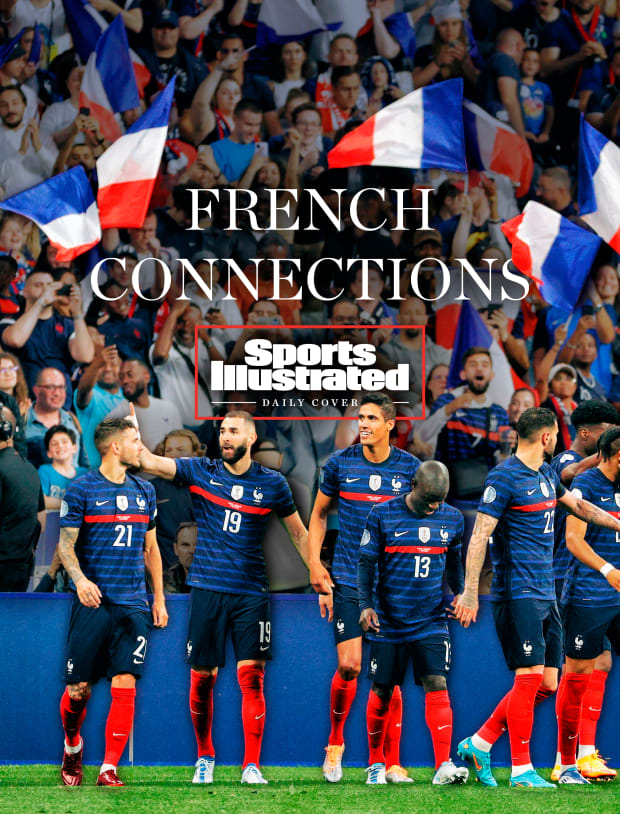
Geoffroy Van Der Hasselt/AFP/Getty Images
That mission is challenged almost every day. For Les Hijabeuses, each step across the white lines of a soccer pitch is a leap into a legal gray area. Before a match, even at the amateur level, someone wearing a hijab needs first to appeal to the discretion of a referee, who can send them to the stands—or ignore a directive from the very top of the sport.
At the heart of the ban is a broader national commitment to secularism. Similar to the U.S., the separation of church and state is a fundamental ideal in France. But the two nations differ in their application: France doesn’t just separate church and state, it mandates the complete neutrality of the state in all religious matters, as described in the foundational Law of 1905.
For example: The French government does not collect census information on race, religion or ethnicity. Public officials cannot be sworn in with a holy text. And, since 2004, overt religious symbols—headscarves, crucifixes, yarmulkes—are banned in state schools and public institutions.
The soccer ban, in particular, is not French law, nor is it an official government directive. But almost all soccer in the country—from the lowest rungs, all the way up to the national team—is governed by the French Football Federation (FFF), which itself is empowered by the government’s Ministry of Sport. The FFF maintains it enforces the ban as an extension of the French republic’s established values.
That set of complex, secular values—loosely referred to as laïcité, an ideological pillar that casts its net over religion (legally) and ethnicity (socially)—was enshrined in France’s 1958 constitution, guaranteeing that “all citizens, regardless of their origin, race or religion, are treated as equals before the law and respecting all religious beliefs.”
With the FFF, that’s reflected in its core mission to “promote the values of laïcité, tolerance and diversity.” (In a statement last year to Al Jazeera, the FFF explained it “has a public service mission; it applies the laws of the Republic.” The FFF did not respond to multiple requests for comment from Sports Illustrated.) But many, including Dr. Haïfa Tlili, a sociologist and founding member of Les Hijabeuses, contend that the hijab ban in soccer doesn’t actually respect the Law of 1905, or laïcité.

“This ban calls into question the freedom of conscience,” says Tlili, “which is a very strong value of the Republic.” She also points out the ban on religious symbols is not being applied to soccer players with religious tattoos, such as a crucifix. Rather, she says the spirit of the law is being manipulated to discriminate. Muslim women, she says, are “not a new population [in France]. … I make the connection to colonialism. It’s imperialist—that’s why you would impose [the ban on] this population.”
FIFA, too, previously banned head coverings in international soccer, a rule the organization attributed to player safety. But after pressure from the United Nations and from several national federations, and following a two-year trial period, the ban was ultimately lifted, in 2014. The FFF, meanwhile, not only maintained its ban, the rule was nearly turned into French law.
In January, conservative politicians launched a campaign to apply the FFF ban to all organized sports, under French law. (Currently each sporting federation makes its own rules on the matter.) When an amendment was first passed in the French senate and raised for debate, Les Hijabeuses rallied.
The group played protest games outside of the senate, in the Luxembourg Gardens, chanting “Nous, on jouera!” (We will play on!) And Houalef, the outfit’s co–social media coordinator, helped members drum up support on social media for both a petition, which saw more than 70,000 signatures, and an op-ed, which was signed by the likes of former national team captain Lilian Thuram, retired NBA player Ronny Turiaf and Manchester United legend Eric Cantona.
Les Hijabeuses declared victory when the amendment was eventually dropped by the lower house of the French parliament, but it’s still targeting the FFF ban, for which it has raised an appeal to the Council of State, France’s supreme court for administrative issues.
This, says Tlili, “is about more than being visible. It’s about not being silenced anymore.”
Until Les Hijabeuses’ appeal is heard, though, the FFF ban still stands. Which means that in 2024, when Paris hosts the Summer Olympics—with all the world watching—the country with the biggest Muslim population in Europe may still prohibit its women from wearing hijabs while playing the nation’s most popular sport.
This is all part of a complicated French history of diversity and inclusion—of laïcité being applied in theory but running into issues with the nuances of religion and ethnicity. That struggle can be seen throughout the country’s storied soccer history, where, at best, there is harmony and a celebration of identity through diversity. At worst? Division, discord, discrimination.
And it all played out from 1998 to 2018, a 20-year span that saw France win two World Cups.
“When you win, you’re a French player. When you lose, you’re [not].”
That’s how Patrice Evra sees the status of a dual-national within the French national team. He would know: He was born in Senegal, moved to Paris shortly afterward and eventually rose to become the captain of Les Bleus.
The summer of 1998, back when Evra was just a fan, was a time of reverie. France hosted the World Cup and won it in Paris, sending an entire nation into the streets to celebrate. The squad that placed the country’s first star above its crest was hailed as a model of diversity, a champion of the social ideals of laïcité. The team was filled with immigrants and sons of immigrants—Zinedine Zidane, Thierry Henry, Thuram—who belted “La Marseillaise” before games and kissed the jersey after goals.
In headlines and in stadium chants, the phrase was “Black, Blanc, Beur”—a play on the “bleu, blanc, rouge” of the French flag. (“Beur,” in French, refers to a person of North African ancestry.) French president Jacques Chirac praised the team and weaponized their success against an anti-immigration movement, declaring: “This tricolour and multi-colour team has given a beautiful image of France and its humanity.”
In Chirac’s eyes, the team showed that France “has a soul, or is searching for one.” Soccer, as it often does, had united a nation and burnished a common thread. Evra suggests the success of the 1998 team even played a role in changing family dynamics in French society. “Everyone was together,” he says, “so you were allowed—even if you were Algerian or Senegalese—to [marry] a French [person], to be accepted in their family.”
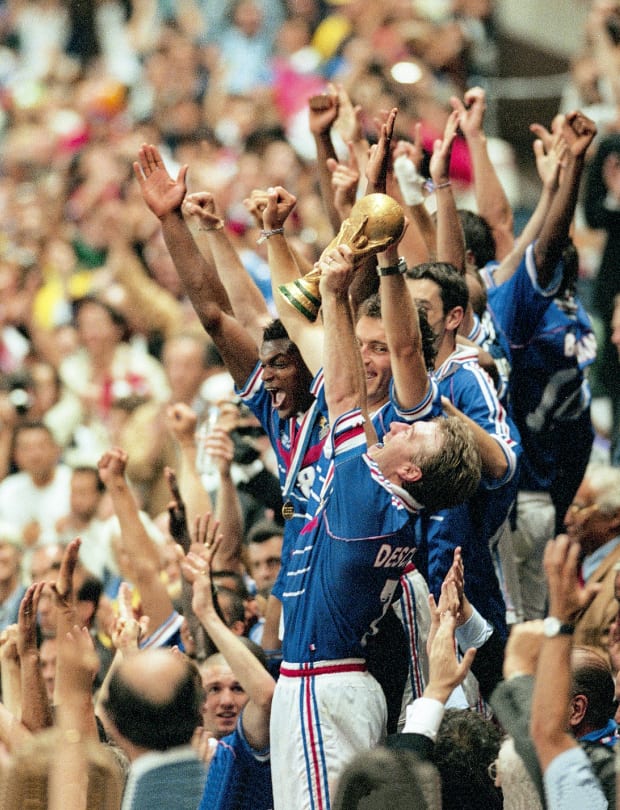
Bob Martin/Sports Illustrated
The reverie would last only so long. At the 2010 World Cup in South Africa, French media vilified the national squad for a team-wide protest after the federation sent forward Nicolas Anelka home following a halftime disagreement with manager Raymond Domenech. The team would go on to crash out of the group stage without winning a match, and footage of the players’ refusal to leave the team bus for a training session was broadcast around the world.
Evra, who captained that team, claims that players shouldered the blame because politicians back home needed a scapegoat for France’s failures. “When the politicians get involved in football, that’s where the damage is,” Evra says. “That’s when disaster happened.”
One year later, after the FFF dismissed Domenech and installed Laurent Blanc, the new manager found himself at the center of an ethnicity controversy. Blanc (who played a veteran role on the triumphant “Black, Blanc, Beur” team) had already ended France’s policy of providing halal meat at team meals when the investigative website Mediapart revealed he’d pushed to limit the number of dual-national players in France’s youth setup.
“I get the impression we’re really forming the same prototype of players: tall, strong, powerful,” Blanc said in a conversation that had been recorded and leaked. “Who is tall, strong, powerful? The Blacks.”
Blanc eventually issued a halfhearted apology (while attacking the media for insinuating he was racist or xenophobic) and, despite the recording, he was cleared of wrongdoing, while a sports minister deemed his comments “borderline tending toward racist.”
Evra, who retired from the game entirely in 2019, remembers the racism and discrimination he experienced elsewhere across his 12-year international career. He recalls letters sent to the FFF training center at Clairefontaine telling him to “go back to Africa with your monkeys.” And he remembers how, when French politicians visited, seating charts were rearranged to put more white players in photo ops—to have, he says, “more people looking like French people.”
“Players were asking me, ‘Patrice, why?’ And I say, ‘Because we are not home, no matter if we have the French passport,” Evra says. “We [looked at] all the pictures with the French president, and there’s not any Black person [standing] next to him.”
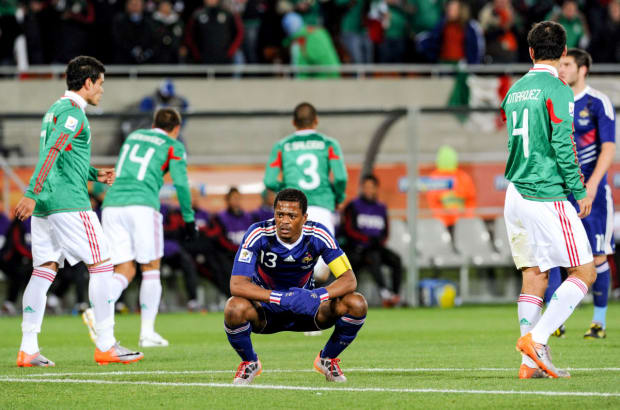
Brian Stewart/EPA/Shutterstock
Before Euro 2016, which France hosted, the national team once again found itself at the center of a tense discussion on ethnicity. Striker Karim Benzema, who is of Algerian descent, claimed at the time that he was excluded from the French squad because manager Didier Deschamps had “bowed to the pressure of a racist part of France,” following ISIS attacks around Paris. Benzema, however, had been suspended from the French team that winter after being investigated for complicity in attempted blackmail in a sex-tape scandal involving another national team player, which many took as the actual reason for his absence. (The FFF did not directly address the incident in omitting Benzema, referring only to “the ability of players to work towards unity.” Benzema was eventually found guilty by the Versailles criminal court; he was issued a one-year suspended jail sentence and a fine of $84,000.)
Right-wing politicians and anti-immigration hard-liners rushed into the discussion about the French team’s diversity. Marion Maréchal-Le Pen, the granddaughter of National Front founder Jean-Marie Le Pen, said Benzema should “go and play in his country,” meaning Algeria. Marine Le Pen, who would later finish second in the 2017 and ’22 presidential elections, said Benzema “hides his wickedness behind a violent charge against the French people.”
But the popular sentiment around Benzema has since evolved. This year he became the first French player in more than 20 years to win the Ballon d’Or, as the world’s best player, after leading Real Madrid to La Liga and Champions League titles. His friction with the French team and his Algerian origins were no longer at the forefront as he prepared to lead Les Bleus in Qatar before pulling out with a thigh injury Saturday.
Evra, for one, thinks the conversation should be more nuanced. “When Benzema won the Ballon d’Or, I [sent him] the French flag and the Algerian flag,” he says. “It’s not like, because we win, we forget [and] we are only French. We love both countries. We pick to play for [one] country, but we can love two countries.”
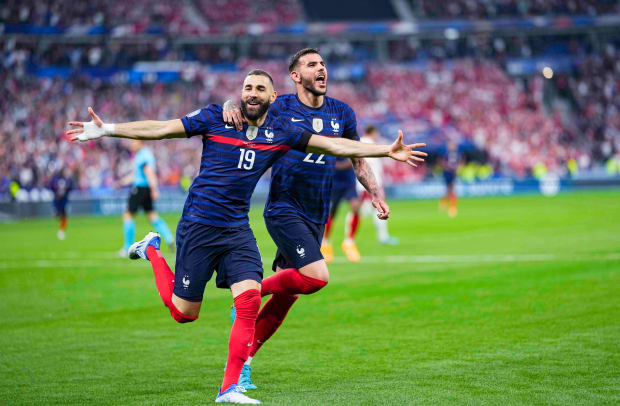
Thor Wegner/DeFodi Images/Getty Images
Twenty years after the “Black, Blanc, Beur” triumph, at the 2018 World Cup in Russia, France added a second World Cup star to its crest. And once again the team’s diversity—the nation’s deep reserve of talent—was on full display. Nineteen of the 23 players on that squad were eligible to play for another country. And another 29 players in Russia had been born in France (including 13 who played on a French U18 or U21 team) but competed for another nation. (In Qatar, there will be 38 French-born players on other teams.)
After France’s victory in the Moscow final, one of the most acute examinations of that team’s makeup played out on late-night TV, of all places. In a clip that went viral, The Daily Show host Trevor Noah joyously claimed “Africa won the World Cup.” His jab was partly a celebration of the team’s diversity, and partly a reminder of France’s colonial history, but mostly it was meant to highlight the squad’s African origins following a triumph, rather than after a defeat.
Subsequently, the French ambassador to the U.S. sent a strongly worded letter to Noah, noting “France does not refer to its citizens based on their race, religion or origin. To us there is no hyphenated identity.”
The exchange perfectly captured the discourse over the French team’s diversity and how it was celebrated. And in his reply Noah threw some gas into the fiery debate over laïcité: “Why can’t [a player] be both? Why is that duality only afforded to a select group of people? … In order to be French, you have to erase everything that is African? ... I don’t take their French-ness away, but I don’t think you need to take their African-ness away.”
Evra remembers how it went both ways for him—when he chose to play for France over Senegal, he says he was criticized even within the Senegalese community in France. “When you pick your national team, it’s not just about football. It becomes political.”
In Qatar, the first predominantly Muslim nation to host a World Cup, French players will undoubtedly be seen in Muslim prayer over the coming weeks, while others might make the sign of the cross after singing “La Marseillaise.” This global stage will again be a showcase of the diversity that briefly united the nation in 1998—as well as a source of contention, for those displays of difference.
Back in France, though, the organizers of another soccer tournament are doubling down on those differences, all in the name of unity.
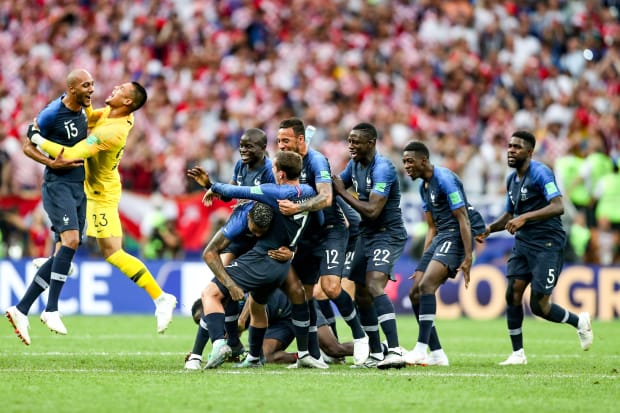
Clive Rose/Getty Images
With a phone in hand, pointed to shoot video, Ferhat Cicek strides through a match in June between Portugal and Italy at the meager Stade Élisabeth in south Paris. Cicek navigates right through the middle of the pitch, and the game tilts around him while he provides hashtag-heavy commentary (Think: DJ Khaled at an AND1 streetball game.) Three different rap songs boom simultaneously from speakers along the sidelines, blasting insults about mothers that would make Marco Materazzi blush.
A referee has just shoved one player and challenged another to a fight when Cicek, 42, intervenes, issuing the ref a verbal red card and starting to officiate the match himself, camera still in hand, commentary still on full blast. He’s wearing a pair of tinted aviators, like what Cristiano Ronaldo might sport on an Ibiza yacht, and a muscle tee with the postcode of this particular Parisian neighborhood, 75014, printed on the back.
Chest out, Cicek walks through the game like he owns it, which he practically does. This is the fourth edition of the Barrio Nation Cup, a soccer tournament he helped create. Unique in its diversity and hyperlocality and flair—in later rounds, onlookers will crowd the pitch to the point where they became the touchline; every goal will be a chance to storm the field and break into a celebration of dance and song—the event is an “antidote,” Cicek says, to France’s divisions and the polemics surrounding laïcité.
Every player here is French, but among 14 teams there’s only one squad actually named France. The rest of the field is made up of teams populated by the country’s most populous diasporas: Senegalese, Algerian, Portuguese, Congolese … . Other teams represent smaller Parisian communities, like the Kabylie (a Berber community native to northern Algeria) and Dom-Tom (a representative term for overseas territories in the French republic, like Martinique, Réunion, Guadeloupe and French Polynesia, among others).
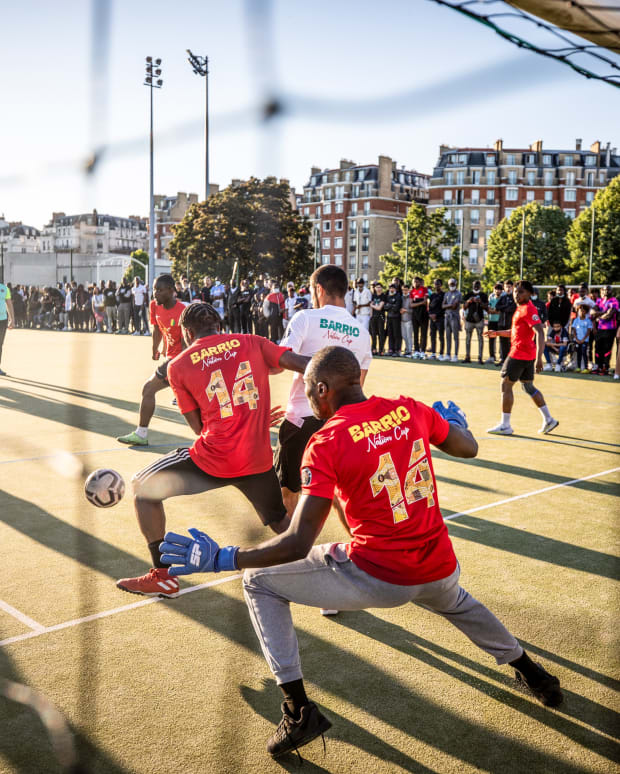
Courtesy of Barrio Nation Cup
Any ethnic group that puts together a 12-person team can play, but there’s one rigid requirement for entry: At least eight of those 12 players must live in the Quatorzième, the 14th of 20 arrondissements, or districts, that divide Paris. The majority of the players have roots in the countries they play for, with a few exceptions. For example: The brother of AC Milan midfielder Tiémoué Bakayoko, who’s from the neighborhood and of Ivorian origin, played this summer for the Italian team on the basis that his brother lives and plays in Italy. (Kylian Mbappé, France’s star forward, would be eligible for four teams: Cameroon, through his father; Algeria and Kabylie, through his mother; and France.)
In between games, over Turkish tea, Cicek lays out why all of this matters. “The most important story to tell is that France is not just white,” he says. “The face of France has changed, because many different people have come to France. My origin is Turkish, but I am French. In the system, I am Turkish. With the tournament, I want to show that France is Arab, Black, Muslim, Christian, atheist, white, Jewish—all people working for France. It is my fight.”
And so his tournament is a festival of nuance. Cicek says that last year Bakayoko paid for the players’ jerseys, and Cicek, who works as a Nike ambassador, helped nail the details. For the Ivory Coast, he incorporated the intricately woven West African kente pattern into the shirt’s design. For Mali, whose national team is called the Eagles, the numbers were designed as feathers.
“I like details; they’re important,” says Cicek. “For example, when a white person moves [abroad] they are an expatriate, but an African person [in France] is an immigrant. What is the difference? Small details. But details tell us everything.”
Walid Guemmi sees those details. At 26, he’s a BNC regular, and he coaches the U11 squad for Paris Alésia FC, the local youth club that hosts the tournament. Born in France to a family of Moroccan immigrants, Guemmi remembers years ago doing his French homework alongside his mother so they could learn the language together. He describes the polarity of his identity as “being between two chairs” and says now that his involvement in soccer is out of a “tradition of empathy” in the neighborhood.
Says Guemmi: “When I go to Morocco, they say that I’m French. And when I’m in France, they tell me I’m Moroccan. When [things go bad], we feel these differences. But when everybody’s happy, we don’t.”
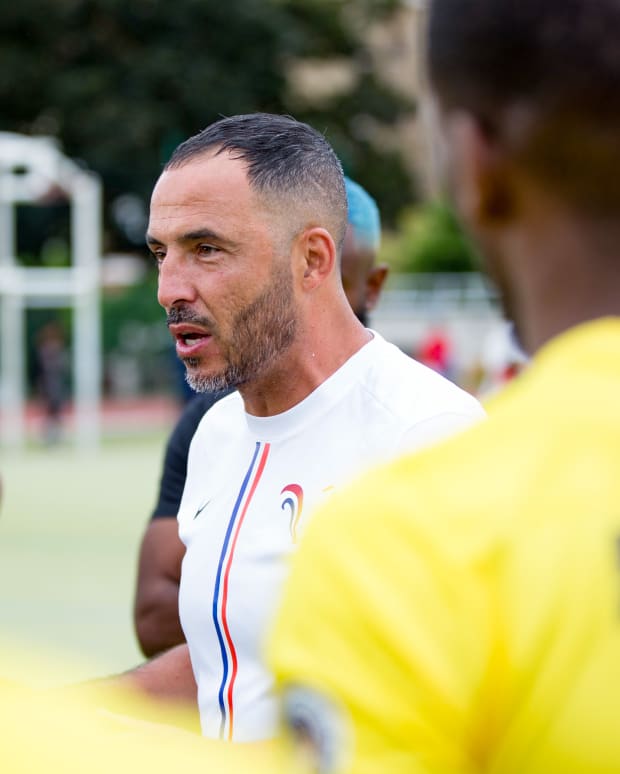
Courtesy of Barrio Nation Cup
Guemmi, like Cicek, believes in the power of the neighborhood. Whereas laïcité and secularism focus on broad strokes that try to paint everyone as equal by law, the Barrio Nation Cup celebrates a canvas colored by difference.
“It’s always up to others to define who we are,” says Guemmi. “The only place we’re accepted is our neighborhood. So wherever we go, we say we are from the Quatorzième, because we have always been accepted here. I think that’s a really good way to express ourselves.”
Throughout the World Cup, Guemmi and Cicek will find themselves at Stade Élisabeth, in the clubhouse, along with hundreds of Paris Alésia youth players, including many who participated in this year’s Barrio Nation Cup. Senegalese and Tunisian and Portuguese players will cheer their respective national teams on. But when France lines up, the 14 teams of the Barrio Nation Cup will boil down to one—united by difference, singing one anthem.







